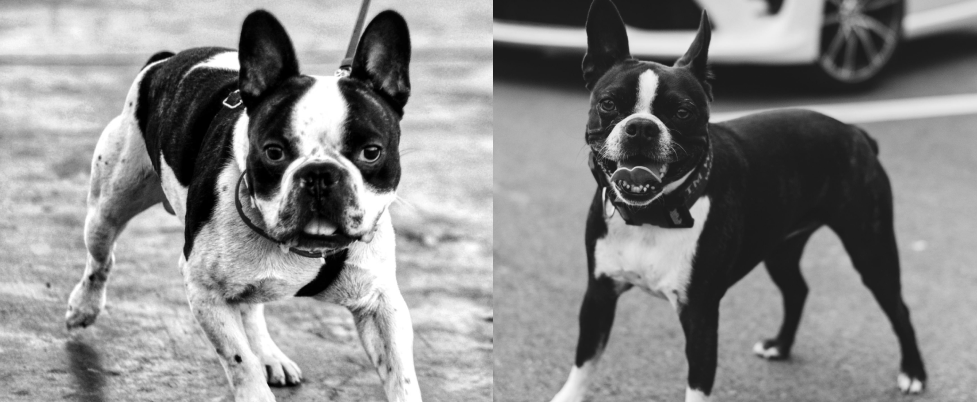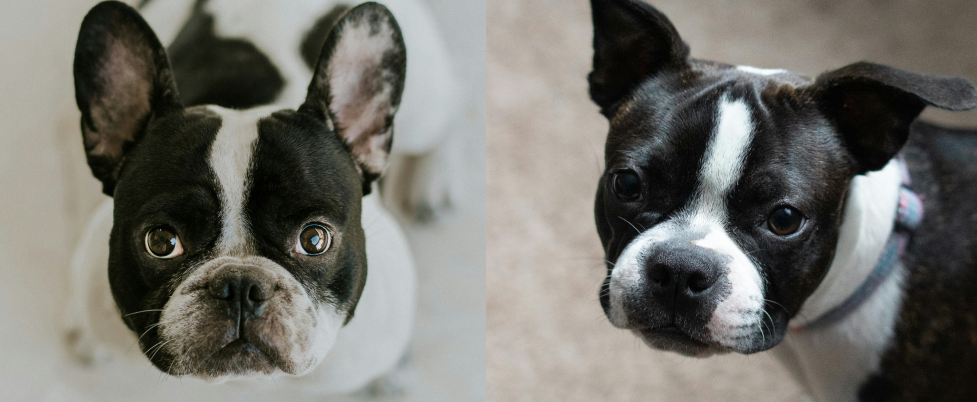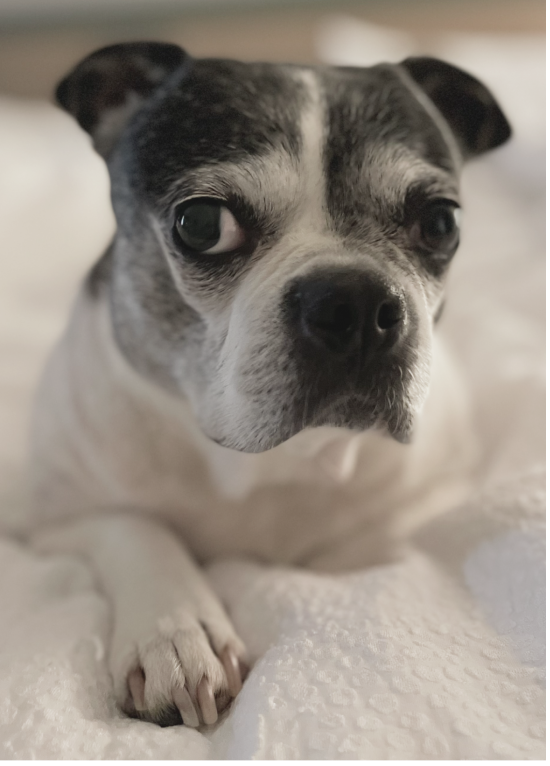THE BOSTON TERRIER BREAKDOWN / BREED HISTORY & FUN FACTS

Disclaimer: I am not a veterinarian. Always consult a professional for guidance specific to your dog’s breed and needs.
Introduction
Boston Terriers and French Bulldogs are two of the most popular small dog breeds, both loved for their compact size, flat faces, and affectionate personalities. Their endearing traits, including their playful and loyal nature, often lead to comparisons between the two. However, despite their similarities, there are key differences in their temperaments, health considerations, and exercise needs. Understanding these differences is crucial for choosing the breed that best fits your lifestyle and home environment. This guide will help you navigate these comparisons to make an informed decision about the right breed for you.
Let’s compare: Boston Terrier vs French Bulldog!
1. Physical Appearance: Spotting the Difference
When it comes to choosing between two of the most adorable, compact companion breeds out there, the Boston Terrier vs French Bulldog debate is a common one for dog lovers. While they may seem similar at first glance—both boasting short snouts, sturdy frames, and irresistible charm—there are some key differences that set them apart. In this section, we’ll break down how these breeds compare in terms of size and weight, coat and colors, and those signature ears and expressive faces, so you can decide which pup best fits your lifestyle and preferences.
Size and Weight
Boston Terriers:
- Typically weigh 12–25 pounds and stand 15–17 inches tall.
- Sleek, lightweight frame.
French Bulldogs:
- Heavier, weighing 16–28 pounds, with a height of 11–13 inches.
- Stockier and more muscular.
Coat and Colors
Boston Terriers:
- Short, smooth coat with distinctive tuxedo-like markings in black, brindle, or seal with white.
- Boston Terriers also come in several color variations, as details in Boston Terrier Color Variations: What’s the Deal?
French Bulldogs:
- Short, smooth coat in various colors like fawn, brindle, white, cream, and combinations.
- May have unique patterns like pied or merle.
Ears and Face
Boston Terriers:
- Upright, pointed ears and a narrower muzzle.
- Expressive, large, round eyes.
French Bulldogs:
- Iconic “bat ears” and a broader, more wrinkled face.
2. Personality and Temperament
Beyond their cute looks and compact size, the real charm of these breeds lies in their personalities. In the Boston Terrier vs French Bulldog matchup, both breeds bring a lot of heart—but in very different ways. Whether you’re looking for a lively sidekick or a laid-back snuggle buddy, understanding their unique temperaments can help you find the perfect fit for your home and lifestyle. Let’s take a closer look at how their personalities compare, from playfulness and energy levels to social behavior and adaptability.
Boston Terriers
- Nicknamed the “American Gentleman” because their marking make it look like they are wearing a tuxedo.
- Playful, energetic, and eager to please.
- Tend to form strong bonds with family members but are adaptable to new situations.
French Bulldogs
- Known for their charming and laid-back attitude.
- Slightly less energetic but very affectionate and great companions.
- May exhibit stubbornness during training.
Key Difference
- Boston Terriers are more active and playful, while French Bulldogs are more relaxed and cuddly.
3. Health Considerations
Common Health Issues
When comparing Boston Terrier vs French Bulldog health concerns, it’s important to understand the common issues that may affect each breed. While both are brachycephalic (short-nosed) dogs and share some similar risks, there are notable differences in their overall health profiles, potential genetic conditions, and long-term care needs. In this section, we’ll break down the typical health challenges each breed faces, so you can make a well-informed decision and be better prepared to support a happy, healthy life for your pup.
Boston Terriers:
- Prone to eye conditions like cataracts or corneal ulcers.
- Brachycephalic issues but typically less severe than French Bulldogs.
French Bulldogs:
- Higher risk of respiratory issues due to their shorter snouts.
- Prone to hip dysplasia and skin conditions like allergies.
Lifespan
- Boston Terriers: 11–13 years.
- French Bulldogs: 10–12 years.
Vet Advice
- Regular vet checkups are essential to manage breed-specific health concerns.
- For more information on brachycephalic breeds, visit the American Veterinary Medical Association (AVMA).
4. Exercise and Activity Needs
When it comes to staying active, not all small breeds are created equal. In the Boston Terrier vs French Bulldog comparison, their exercise needs can differ more than you might expect. While both breeds enjoy playtime and companionship, one tends to be a bit more energetic and eager to zoom around the yard. In this section, we’ll explore how their activity levels stack up, what kind of daily exercise each breed thrives on, and how to keep them healthy without overdoing it.
Boston Terriers
- High-energy breed, requires 30–60 minutes of exercise daily.
- Enjoy games like fetch and interactive play.
French Bulldogs
- Lower exercise needs, about 20–30 minutes daily.
- Prefer short walks or light playtime indoors.
5. Grooming Requirements
Grooming is an important part of keeping your pup healthy and looking their best—but luckily, both of these breeds are pretty low-maintenance. In the Boston Terrier vs French Bulldog grooming comparison, there are a few subtle differences to keep in mind, from coat texture and shedding to skin care and cleaning routines. This section breaks down what to expect when it comes to brushing, bathing, and overall grooming needs for each breed.
Coat Care
- Both breeds have short coats that are easy to groom.
- Weekly brushing is sufficient to minimize shedding.
Special Care
- French Bulldogs: Regular cleaning of facial wrinkles to prevent infections.
- Boston Terriers: Eye care to manage potential irritation.
6. Training and Intelligence
When it comes to smarts and trainability, both of these breeds have their own unique strengths—and quirks. In the Boston Terrier vs French Bulldog comparison, you’ll find that while both are intelligent and eager to please, their approach to learning can be quite different. This section explores how each breed responds to training, what motivates them, and how their personalities influence their ability to pick up commands and good behavior.
Boston Terriers
- Highly trainable and eager to learn.
- Respond well to positive reinforcement and enjoy mental stimulation.
French Bulldogs
- Intelligent but stubborn, requiring patience during training.
- Short training sessions with treats work best.
7. Living Conditions
Whether you live in a cozy apartment or a spacious home, it’s important to choose a dog that fits your lifestyle. In the Boston Terrier vs French Bulldog debate, both breeds adapt well to a variety of living situations—but there are a few differences that might make one a better match for you. This section covers how each breed handles different environments, from apartment life and climate tolerance to how much space they really need to feel comfortable and content.
Boston Terriers
- Thrive in various environments, from apartments to larger homes.
- Sociable and enjoy companionship,
- Can be high strung and may experience separation anxiety if left alone for too long.
French Bulldogs
- Best suited for indoor living due to sensitivity to temperature extremes.
- Tend to prefer lounging over high-energy activities.
FAQs About Joining the Boston Terrier Community
How can I find a local Boston Terrier Club?
To find a local Boston terrier Club, start with online searches, particularly on websites like the American Kennel Club (AKC) or the Boston Terrier Club of America (BTCA), which list affiliated local groups. Social media platforms and Meetup also host breed-specific communities that often organize in-person meetups. Attending dog events or shows is another great way to connect with Boston Terrier enthusiasts who might know of nearby clubs. Additionally, local veterinarians and pet trainers can provide valuable recommendations. These steps will help you join a supportive and engaging community for Boston Terrier owners.
Are there any costs to joining these groups?
The costs of joining Boston Terrier groups or clubs can vary widely. National organizations like the Boston Terrier Club of America (BTCA) often charge annual membership fees, typically ranging form $40 to $60, which may include newsletters, event discounts, and access to exclusive resources. Local clubs or meetup groups may have smaller fees or ask for donations to cover event costs. Social media groups are usally free to join by may request optional contributions for organized activities. Always check the specific group’s website or contact organizers for details about membership requirements and associated costs.
Do Boston Terrier meetups allow mixed breeds?
Boston Terrier meetups vary in their inclusivity, with some welcoming mixed breeds and others focusing exclusively on purebred Boston Terriers. Breed-specific clubs or events organized by official organizations, such as the Boston Terrier Club or America, may have stricter guidelines and limit participation to purebred dogs. In contrast, local groups or informal meetups often adopt a more relaxed approach, inviting Boston Terrier mixes and other breeds with similar traits to joing the fun. Check the specific group’s rules or event descriptions to determine their policy on mixed breeds.
Conclusion:
Both breeds make loving and fun companions, but understanding their unique traits ensures a happy and harmonious match. Consider your own lifestyle, living situation when trying to decide which breed is best for you or your family.
Boston Terriers
- Active and athletic, requiring a bit more exercise than Frenchies
- Highly trainable and smart
- Playful and energetic, can be more high strung
- Good small dogs for apartments or larger homes with yards
- Friendly and loving companions who become very attached to owners
French Bulldogs
- More relaxed with lower exercise needs
- Smart, but can be a little more stubborn
- Lighter playtimes and lounging preferred
- Good small dogs for apartments or larger homes, but more sensitive to hot weather outdoors
- Charming and loving, and also great companions
Whether you choose a Boston Terrier or a French Bulldog, giving them love, care, and attention will make them a cherished part of your family!

Additional Resources
For additional resources, refer to the Boston Terrier Club of America
List of Frenchie and Boston rescues
American Boston Terrier Rescue
Pet Finder – search for Boston Terriers or French Bulldogs
Northeast Boston Terrier Rescue
Southern Nevada Boston Terrier Rescue
SNORT – Short nose only rescue
Other articles by this author

“Hi! I’m Weezie, a spirited Boston Terrier / French Bulldog mix and self-proclaimed expert on everything Boston.